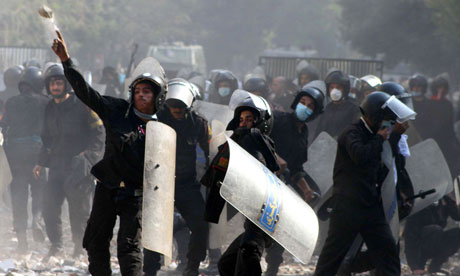Demonstrators continue to call for military rulers to step down as casualties mount following police advance on Tahrir Square

- News
- World news
- Egypt
Egypt protesters call for postponement of elections
Demonstrators continue to call for military rulers to step down as casualties mount following police advance on Tahrir Square
- The Guardian, Thursday 24 November 2011
- Article history

Egyptian protesters want elections scheduled for Monday to be postponed and a council of elders to replace the military rulers who on Wednesday again sent in security forces to quell demonstrating crowds.
The current protests are seen as a second – and decisive – phase of the January revolution that led to the overthrow of President Hosni Mubarak.
In the symbolic heart of the revolution, Tahrir Square, demonstrators were chanting the same slogans used 11 months ago, but this time directing them at the interim military ruler, Field Marshal Mohamed Hussein Tantawi. "If the wheels of democracy move on Egypt and this problem is still here, then democracy will have failed," said Ikramy Esayed. "Next Monday is very important for Egypt, but not because [the poll] should be held, but because we should acknowledge that this is not the time."
A second man, Nashad Bishara, agreed. "It is unsuitable now to hold elections," he said. "For those who love Egypt stability must be established first. The truth is the army doesn't want elections."
Field hospitals set up around the square were overrun with casualties after riot police closed in on tens of thousands of people inside the square. Doctors said there appeared to have been more casualties over the past five days than during most of January, when several thousand people were injured.
Injuries were mostly from gas being fired by troops, who briefly negotiated a truce with demonstrators before violence re-erupted. The Guardian saw two women convulsing violently in a makeshift clinic set up in a church courtyard after inhaling gas. Doctors are reporting large numbers of patients who have reacted severely to the gas being fired. "I have not seen a reaction like this," said one doctor in a triage centre inside a church on a street near Tahrir Square. "We are sending a lot of people to hospital. We can't just treat them here."
In one of the field hospitals a doctor was killed, according to her colleagues and websites. Dr Rania Fouad is believed to have died after inhaling gas.
After offering on Tuesday to hold a referendum on the transition of power to civilian rule and maintaining that a political process was on track, the country's military rulers remained silent on Wednesday.
Dissatisfaction with the slow pace of change continued to mount, along with suspicion that Tantawi's apparent concessions are a bid to buy time or avoid the transition of power.
Britain condemned the violence in Egypt, but the foreign secretary, William Hague, said he recognised Tantawi's commitments. Hague urged Egypt to hold fair, credible and transparent elections but did not press for a timeframe – a shift from the government's stance of earler this year when it pushed for a September ballot.
Protest numbers in Tahrir Square have continued to build since Saturday and by mid-evening on Wednesday night a sea of people matched the scenes of January. "The people demand the end of the field marshal," said one large banner.
Away from the square the streets were tense, with some residents accusing demonstrators of inflaming the situation by demanding immediate reforms.
"We are adrift in a boat without a captain and with everyone fighting for control of the wheel," said Captain Abdul Aziz inside a burned-out police station in the city's west. "It is dangerous and unpredictable and people should be careful."
In a nearby room hundreds of vests due to be handed out to election monitors on Monday sat in storage. Few in the police station thought the vests would be used.

No comments:
Post a Comment